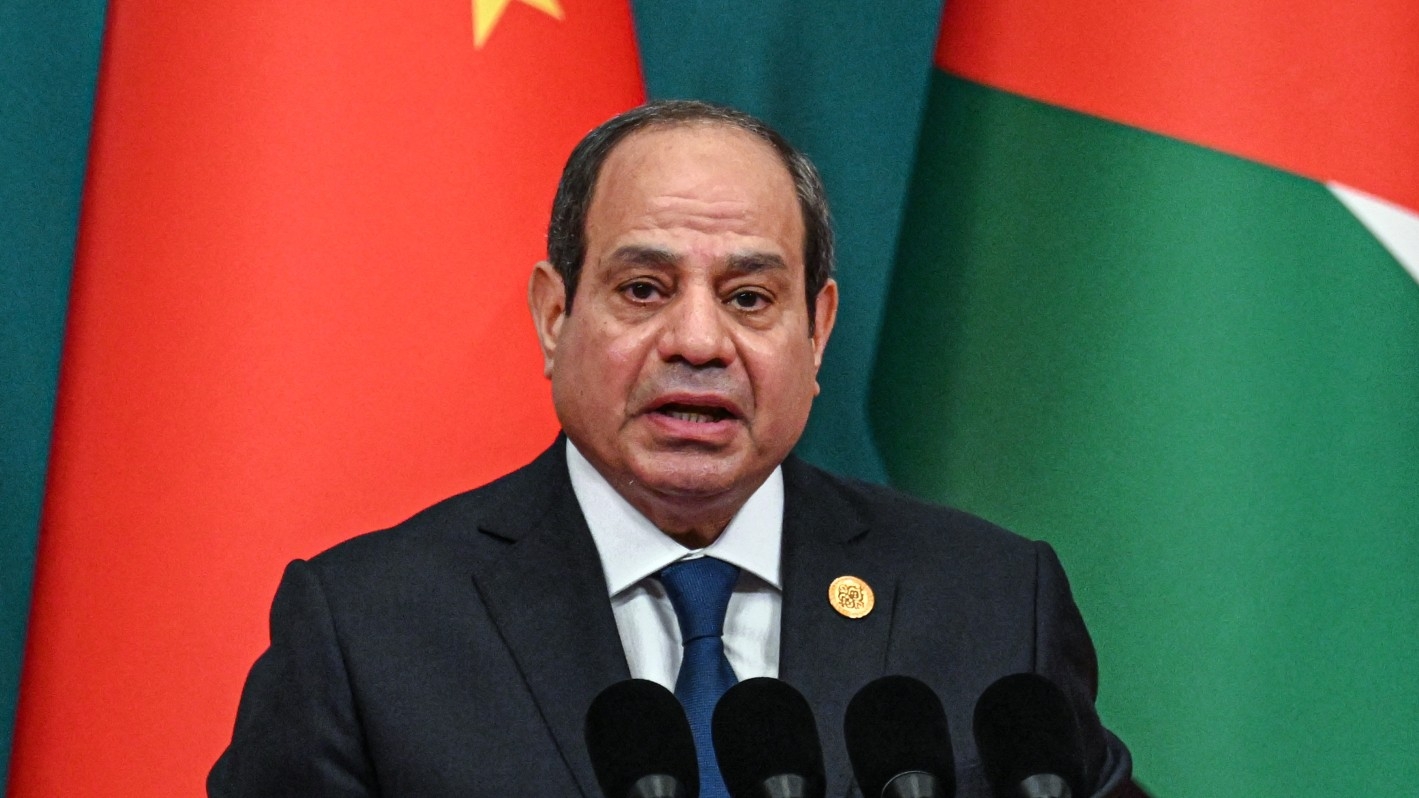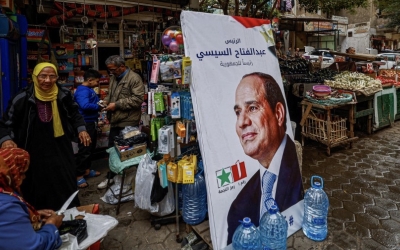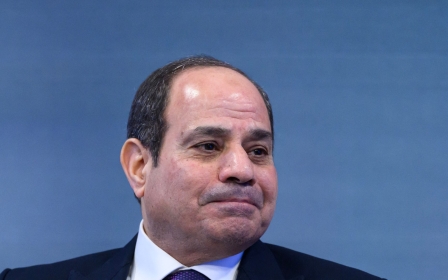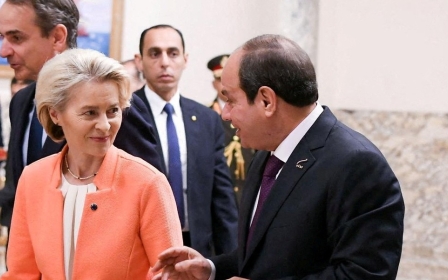Why Egypt's 'New Republic' is increasingly vulnerable to implosion

Ten years have passed since Abdel Fattah el-Sisi assumed the presidency of the Arab world’s most populous country. Riding a wave of mass fear in Egypt’s turbulent society, and playing on the yearning for stability among the middle and upper classes, Sisi staged a coup in the fateful summer of 2013 against the country’s first democratically elected president.
He promised Egyptians security and economic prosperity - a New Republic. He failed.
Successful only in squashing the revolution and all forms of dissent, the New Republic has had serious ramifications countrywide.
In 2023, Egypt’s external debt reached a record $165bn, up from around $42bn when Sisi assumed office in 2014.
During that decade, Egypt was required to pay more than $132bn in external debt service. The value of its currency plunged. Since 2016, the US dollar has appreciated against the Egyptian pound by approximately 462 percent, while urban inflation has soared to a staggering 35.7 percent, according to government data.
New MEE newsletter: Jerusalem Dispatch
Sign up to get the latest insights and analysis on Israel-Palestine, alongside Turkey Unpacked and other MEE newsletters
The quality of life for a large section of Egyptian society has degraded severely. The government stopped publishing stats on the poverty rate in December 2020. The inflation rate for food prices reached 72 percent last year, with catastrophic implications for Egyptian households, including many who are unable to afford fresh vegetables and meat.
National power cuts have become a daily reality, described by Reuters as a “symbol of malaise a decade after Sisi’s rise”.
Government spending on health, already as low as 1.7 percent of GDP in 2014/15, fell to 1.4 percent in 2023/24. Shortages in essential medicines and medical supplies have become chronic. Social media platforms are flooded with posts from desperate users searching for medicines they cannot find in pharmacies.
Mass exodus
By 2019, one study estimated that at least 62 percent of Egyptian physicians had resigned from their government jobs or left the country due to precarious working conditions.
In 2021, the number of Egyptian scholars who earned PhD degrees from local and international universities declined by 73 percent compared with 2009, according to official data.
In 2023/24, government spending on education was just 1.9 percent of GDP, lower than global rates and the average spending in middle-income countries.
Egyptians are leaving the country in droves. In 2013, official statistics put the number of Egyptians abroad at just over six million. That figure nearly doubled to more than 11 million in 2021. Thousands of Egyptian nationals have applied for asylum in European countries; between 2021 and 2023, the number of applications quadrupled, reaching more than 26,500.
The regime has ... no broad class alliance invested in its survival. The only social contract that exists is repression in exchange for nothing
By the end of 2022, Sisi’s biggest backers, the UAE and Saudi Arabia, had become increasingly uncomfortable with his economic blunders and mismanagement of resources.
Requests for bailouts from international donors came with strings attached, including currency devaluation, austerity, and - more dangerously for the regime - the privatisation of military firms involved in the civilian economy, scrapping the privileges that have long allowed them to manipulate the free market.
Sisi announced in November 2022 that two military firms, a petrol company and a bottled water producer, would be listed on the stock exchange. A few months later, Prime Minister Mostafa Madbouly announced that 10 more army companies would be offered on the stock market.
In the summer of 2023, Sisi signed a law to end tax exemptions for government economic activities. But by 2024, no single military firm had been privatised.
Tax exemptions for army business ventures remained in place, as the new law included an exception for economic activities related to “national security”, which could be conveniently interpreted as anything related to the military.
Limited choices
Though dysfunctional, Sisi’s procrastination in curbing the military business empire is understandable. At this point, the officers of the state’s repressive army apparatus are his enablers, and the only remaining loyal constituency to which he answers.
In exchange for their loyalty, he has allowed them to cannibalise state organs and chunks of the economy. Slashing their material privileges could prove suicidal.
Sisi has very limited choices if he wants to remain in power. He will most likely continue to dodge calls to reform the military-economic complex or resort to manoeuvres like selling military firms to private investors who are a front for the military.
The outbreak of the Gaza war in October 2023 proved that Cairo was still relevant in regional politics, not because of its soft or hard power, but because of its geographical proximity to the conflict - and, more importantly, because it is “too big to fail”.
The International Monetary Fund, World Bank, EU, and UAE rushed to bail out Sisi’s regime with more than $50bn by this past March, voicing concerns about further regional instability. But this flood of money does not seem to have changed the economic model of the Second Republic, which rests on debt-financed white elephant projects administered by the military and its partners.
In January, an expansion of the New Administrative Capital was announced, and military firms continued their business as usual. The mountains of debt have, in turn, forged a strong alliance between the military and international capital, investing the latter in the regime’s survival.
The bloodbath after the 2013 Egyptian coup was effective in crushing the revolution and dismantling all activist organisations that could initiate or sustain street mobilisation. A stark contrast can be seen between the boiling anger over Gaza and the near-absence of any expression of that anger - a situation unprecedented in modern Egyptian history.
Revival of dissent
Spontaneous industrial actions and anti-gentrification fights have erupted occasionally, here and there.
Significant anti-regime protests broke out in 2019/20 in several cities, but they were met with brute force and mass arrests. The absence of organised networks was a primary reason for the inability of such protests to coordinate, escalate and articulate a political alternative.
Sisi is well aware of that, and the high level of repression ensured that the dismantled organisations could not regroup. But for how long?
In December 2022, lawyers pushed their syndicate leadership to endorse thousands-strong protests in Cairo and elsewhere against a new electronic invoicing system proposed by the finance ministry.
They staged a national strike in solidarity with six detained colleagues the following month. The detainees were released within days.
Two months later, in March 2023, Khaled el-Balshy, a leftist dissident, won the Press Syndicate election, while independent candidates won four of six contested board seats, inflicting what one observer described as “the first political defeat suffered by the regime in 10 years”.
The regime also failed in recent attempts to impeach the Engineers Syndicate head, Tarek al-Nabarawy, who is by no means a radical but has been trying to limit the security services’ interventions in the syndicate elections.
The slow revival of dissent within professional syndicates has been coupled with an incremental increase in sporadic strikes, largely triggered by demands for pay raises amid soaring inflation.
But many veteran labour organisers have retired, passed away, or been targeted in post-coup crackdowns. Their absence, and the absence of independent unions and the activist networks that evolved during the decade of struggles before the coup, is strongly felt. The current industrial actions, at least for now, lack the experienced cadres and solidarity networks that can link struggles together.
Whether there is an organised opposition or not, social outbursts are inevitable, since Egypt’s economic policies are failing to deliver. The regime has no civil society to absorb or deflect dissent, and no broad class alliance invested in its survival. The only social contract that exists is repression in exchange for nothing.
Such a toxic formula might have enabled the New Republic to survive for a decade, but makes it vulnerable to implosion if society erupts or foreign cash dries up.
The views expressed in this article belong to the author and do not necessarily reflect the editorial policy of Middle East Eye.
Middle East Eye delivers independent and unrivalled coverage and analysis of the Middle East, North Africa and beyond. To learn more about republishing this content and the associated fees, please fill out this form. More about MEE can be found here.






